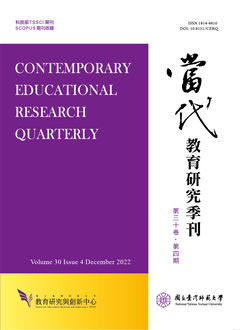

研究目的
因為 COVID-19 疫情爆發,全球高等教育機構在 2020 年面臨前 所未有的挑戰;很多學校關閉校園,暫停教學與學習活動,也有很 多學校轉而改採遠距教學,讓學習不中斷。本研究之目的,主要在 探討全球高等教育在 COVID-19 下所面臨的學習問題,以及臺師大 在疫情間實施全校遠距教學的經驗與省思。
研究設計/方法/取徑
本研究蒐集 2020 年聯合國教科文組織 UNESCO(2020)、全球 大學學會(International Association of Universities, IAU)、UNESCO- IESALC 等國際組織的調查報告重點整理,以掌握疫情期間國際高等教育現況;其次,本研究設計問卷,調查校內學生與教師對遠距教 學的反應。
研究發現或結論
研究發現,學生在疫情期間以在家中上網比例最高,對於學校 採用遠距教學大多能支持,且認為自己有學到新科技,此外認為遠 距教學最需改善的是教師使用的視訊平台太多、網速,以及教師的 教學法;而在教師調查方面,多數教師認為經過這次的挑戰已能掌 握遠距教學,但未來仍將以實體教學為主。
研究原創性/價值
由於臺師大是臺灣在 109 學年度第二學期疫情緊繃期間,唯一 短期關閉實體教室,全校採遠距教學三週的大學,因此臺師大的案 例,非常值得臺灣高等教育未來發展及因應疫情之參考。
教育政策建議或實務意涵
當全球多數國家都已經因疫情嚴峻而全面轉為數位教學的同時, 臺灣因疫情相對緩和,大學未全面實施遠距教學,因此可能成為全 球大學數位能力最不足的國家,無法面對高等教育的數位競爭以及 隨時可能再來疫情,建議大學及教育當局對於高等教育數位學程有 更積極的規劃。
Purpose
Because of the COVID-19 pandemic, higher education institutions around the world are facing unprecedented challenges in the year 2020; many schools have closed their campuses and suspended teaching and learning activities, while others have switched to distance learning to keep learning going. The purpose of this study is to explore the learning problems faced by higher education worldwide in the faceof COVID-19, as well as NTNU's experiences with and reflections onthe implementation of whole-campus distance learning.
Design/methodology/approach
This study first collects survey reports from UNESCO (2020), the International Association of Universities (IAU), UNESCO-IESALC,and other international organizations to understand the current situation of international higher education during the pandemic. Second, this study designed a questionnaire to investigate the responses of students and teachers to distance learning at NTNU.
Findings/results
The study found that students had the highest percentage of Internet access at home during the pandemic, were supportive of the school's adoption of distance learning, and believed they had learned new learning technologies. Other than this, the things that they felt most needed improvement were the excessive number of video platforms used by teachers, internet speeds, and teachers’ pedagogical methods. In the teacher survey, most of the teachers felt that they had mastered distance teaching after this challenge, but that they would focus on physical teaching in the future.
Originality/value
Since NTNU was the only university in Taiwan that closed its classrooms for a short period of time and taught by distance learning for three weeks during the pandemic crisis in the second semester of the 2020 academic year, with the entire school moving to distance learning for three weeks, the NTNU case is a valuable reference for the future development of higher education in Taiwan and pandemic responses.
Implications for Policy/Practice
While most countries around the world have already switched to strict, complete digital learning due to the severity of the pandemic, Taiwan has not yet fully implemented distance learning due to the relatively mild pandemic, and thus may become the country with the least university digital capacity in the world. Unable to face the digital competition in higher education and the possibility of a renewed pandemic that could strike at any time, it is recommended that universities and education authorities plan more proactively for digital programs in higher education.

本著作係採用創用 CC 姓名標示-非商業性 3.0 台灣 授權條款授權.
本刊國立台灣師範大學教育研究與創新中心
106台北市和平東路一段162號 | 電話: 02-7749-3670 | E-mail: cerecerq@gmail.com
教創中心 | 師大 | 電子報 | 線上投審系統
本刊由國家科學及技術委員會人文社會科學研究中心補助經費
© 2014 CERI-NTNU
